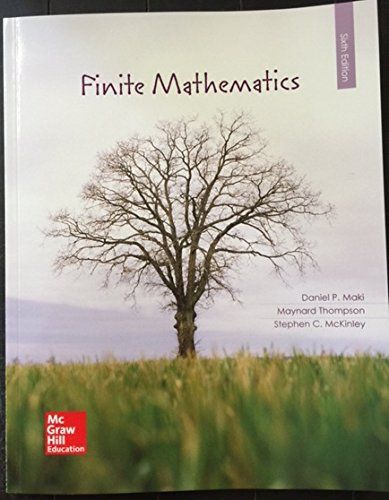Finite Mathematics (Fifth Edition)

 Stefan Waner and Steven R. Costenoble,
Stefan Waner and Steven R. Costenoble,
Brooks/Cole, CENGAGE Learning, Boston, 2011, 2077, xvii+618 pp, Appendix 44pp.
Now in its fifth edition, this book may be used for a one or two-term course in “finite mathematics” for students majoring in business, the social sciences and the liberal arts. It gives a quick entry into the essentials of matrix algebra needed for solving systems of linear equations and linear programming problems. It also gives an introduction to the use of matrices in two-person games in game theory and in the construction of input-output models.
A short chapter covers the basic concepts in the mathematics of finance. The basic notions and methods of discrete probability are dealt with, with a brief introduction to the statistics of empirical data and the use of the normal distribution.
The book is self-contained with a brief review of arithmetic operations on real numbers, algebraic operations on polynomials, real-valued functions and, in particular, linear functions. A short chapter on the basics of sets and operations on sets, as well as counting principles is given in preparation for the following chapters on elementary probability.
The physical layout of the book is attractive. Different colours are used for highlighting texts in different contexts—definitions, results or methods, examples, remarks, and so on. There are plenty of routine exercises for practice, with answers of selected exercises given. The numerical exercises are expected to be done with the aid of scientific apparatus more sophisticated than an ordinary scientific calculator. More specifically, the TI-83/84 Plus graphics calculator and the Excel software are routinely used for the numerical computations. Except for two chapters, the other seven chapters have sections which give details of how those scientific aids are used in the solution of some numerical examples.
There are some new features introduced to support learning—case studies, question-and-answer dialogues, communication and reasoning exercises for writing and discussion. The authors have set up a website specifically for students and users of the book to supplement the normal methods of testing and learning.
Y. K. Leong
National University of Singapore, Singapore.
Source:- Asia Pacific Mathematics Newsletter, Volume 1 No. 2 (April 2011).
It has been republished here with a special permission from World Scientific.